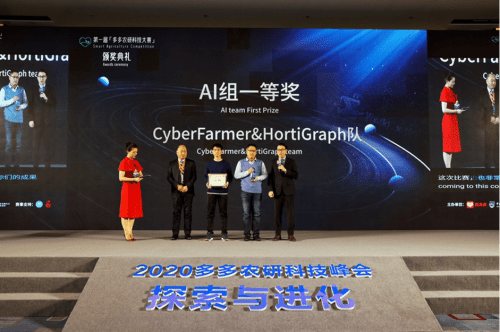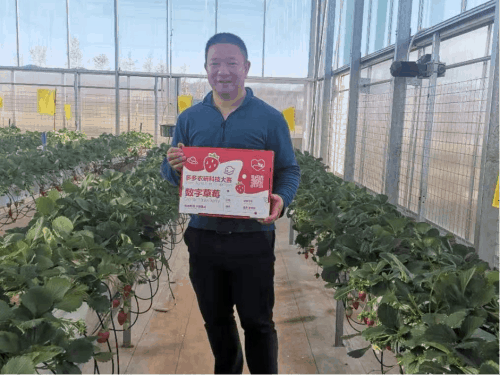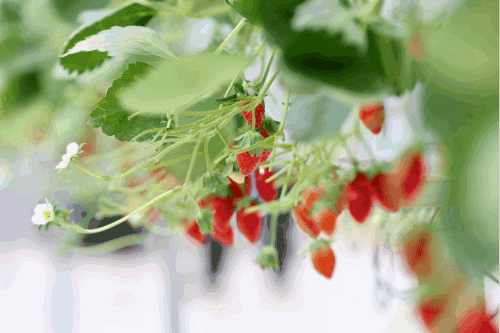Technology beat farmers at growing strawberries during the inaugural Smart Agriculture Competition held over a period of four months in China.
Four technology teams deployed data analysis, intelligent sensors and greenhouse automation to produce an average of 6.86 kilograms of strawberries – 196% above the 2.32 kilograms average for the three teams of traditional growers. The technologists also outperformed farmers in terms of return on investment by an average of 75.5%, according to the competition organisers.

Organised jointly by Pinduoduo and the China Agricultural University, the competition showed potential of using IoT to raise agricultural productivity and increase food security. It is the first cross-disciplinary smart agriculture competition in China hosted by a technology company and university to develop planting methods to raise productivity and yield. The competition, which ended November 30, also received technical support from the Food and Agriculture Organization (FAO) of the United Nations.
“Technology is the force multiplier that helps both the people who grow the food and the people who eat it,” said Andre Zhu, senior vice president of Pinduoduo. “Investing in agriculture benefits the greatest number of people. We are happy to play the role of matchmaker and enabler.”
Based in Shanghai, Pinduoduo was established in 2015 is an online marketplace focusing on agricultural products. It has since developed an agri-focused technology platform, which was recognised as a pioneer in digital agriculture at the recent 2020 World Digital Agriculture Conference held in Guangzhou. The company’s “cloud-agriculture” model was named as one of the top 10 achievements in digital agriculture in the world.
A bountiful harvest
During the competition, various technology teams battled it out inside an automated greenhouse fitted with temperature and humidity controls. The technologists were more precise at controlling the use of water and nutrients. On the hand, traditional strawberry farmers tapped to join the smart agriculture challenge had to achieve the same tasks by hand and experience.
The winning team, CyberFarmer.HortiGraph – primarily made up of researchers from the China Agricultural University and the National Agriculture Intelligence Equipment Engineering Technical Research Center – employed knowledge graph technology to collect grower experience, historical cultivation data and strawberry image recognition. This was then combined with water, fertiliser and greenhouse climate models to create an intelligent decision strategy for growing strawberries.

Meanwhile, one technology team Zhi Duo Mei – comprising of university researchers – has decided at the end of the competition to commercialise its strawberry-planting technology to farming cooperatives after receiving numerous inquiries. Farmers were attracted by the team’s automation technology that showed a more than 60% increase in conventional output.
The new company is named Zhi Duo Mei in honour of the team.
"In agriculture, traditional farmers distrust data scientists, thinking they are flashy yet useless; data scientists also look down on farmers, thinking they are too old-fashioned," said Cheng Biao, team leader of the Zhi Duo Mei team. "Through this competition, we realised the importance of combining both sides' advantages and working together."
Digitising the agriculture value chain
The push into smart agriculture has been part of Pinduoduo’s broader goal of helping China realise the full economic potential of the country’s vast agriculture resources.
One of the first steps in improving productivity is to raise the level of digitization across the value chain, from production to the transportation and sale of food.
Pinduoduo has brought a systems approach to tackling the inter-related issues at various points of the agricultural value chain, committing substantial resources and investments to solve entrenched structural problems in the industry.
Its initiatives include improving downstream market access for farmers and training younger e-commerce talent, revamping midstream logistics infrastructure to reduce waste, lower costs and speed up the delivery of agricultural products. Pinduoduo also works with industry partners and universities
At the end of 2019, the company has covered almost all agricultural production areas in China, with more than 12 million agrarian producers directly connected to its online marketplace serving more than 700 million consumers. to develop upstream technology to increase the resilience of the food supply chain.
Meanwhile, Pinduoduo will explore promoting the technology developed by the teams in its smart agriculture competition to working farms in China. Through its e-commerce platform, the company works with farmers from impoverished regions of the country to sell their produce to urban consumers.
“Precision farming technology can help improve the crop on the production end, while agriculture analytics can cut food wastage by reducing mismatches in supply and demand. For the growers, e-commerce allows them to tap on a much larger market than the local wholesaler, freeing them from the constraints of geography,” said Pinduoduo in a statement.



